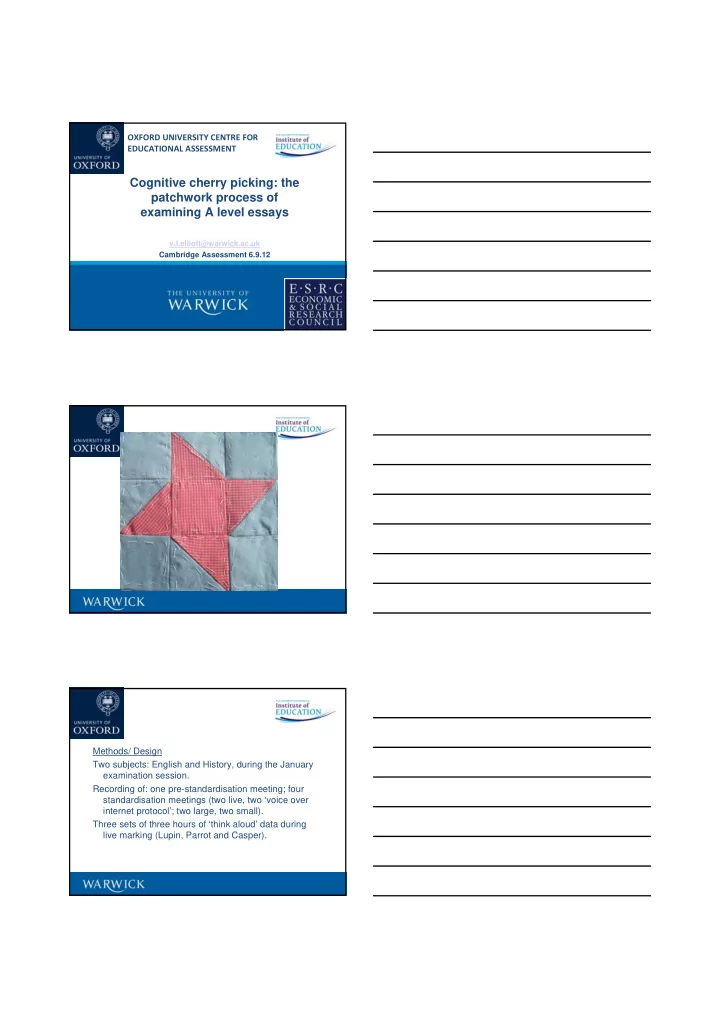

OXFORD UNIVERSITY CENTRE FOR EDUCATIONAL ASSESSMENT Cognitive cherry picking: the patchwork process of examining A level essays v.f.elliott@warwick.ac.uk Cambridge Assessment 6.9.12 Methods/ Design Two subjects: English and History, during the January examination session. Recording of: one pre-standardisation meeting; four standardisation meetings (two live, two ‘voice over internet protocol’; two large, two small). Three sets of three hours of ‘think aloud’ data during live marking (Lupin, Parrot and Casper).
Heuristics and biases
Representativeness/ availability you’ve got several scripts now that are in level 5, and you might go back and think well, this is a far far better level 5 than the William the Conqueror one. That doesn’t mean that the William the Conqueror one is not level 5. You see, it does display the necessary qualities to get into that level. The fact that [the other] two scripts demonstrate those qualities in spades is unimportant. (Principal Examiner, History 1) representativeness Principal Examiner: can we look at J? I found this a bit of a problem one - it’s a very short answer Examiner: Oh golly [they read] Examiner: Good stuff though (.) hard to take exception to any of it. Hardly a word wasted. I can’t believe that wasn’t planned. They probably spent more time thinking about it than writing Principal Examiner: But it’s short isn’t it Examiner *: It is but it’s small writing Examiner: It’s literally getting twice the number of words to the line Senior Examiner: It’s discriminating, no doubt, not wasting a word
comparison that’s putting it above M. Not as far as L [9 second pause] but looking back over M... it’s better than M – no it is better than M. What did M get? Thirty five. So no, that’s not over marking it. (Lupin, think aloud)
comparison Something else to consider is that this time you’re marking both of the items together. If you’ve awarded marks for both answers which are substantially different from each other it is worth reflecting on your decisions before moving on. In the summer in general, it became obvious that most candidates tend to approach both answers at the same level of um answer and therefore if you’ve, if you do have an answer which um has a level five or a level three for example then it’s worth reflecting on your decisions. Comparison (imagined script) I think the weakness of both of the ones that we’ve looked at so far was something that you know, really top candidates will have actually seen in that question which wasn’t addressed by either of them. Would you sort of think that there’s anything that both of them missed out on that you might be expecting from a really strong candidate? Imagined script subordinated to real script obviously I think we need to keep in touch on that always though, because it may well be that virtually every candidate, er, interprets the question in that way and er, er, we don’t want to debar people from getting a really high mark, if everyone’s interpreting it that way. I think we need to keep in touch, on the way people actually answer that question.
Mental frameworks Mental frameworks I’ve usually not got a firm figure in my mind the first time I read through… more a region… particularly not at this stage (.) I mean 50 scripts down the line (.) you know (.) it’s more intuitive Unless you try it (.) you can’t do it didactically (.) you’ve got to [makes motion with pen indicating several lines] **** As you hit about 50 you’ve got it sussed
“I believe it was Plato who said that good judgement consists equally in seeing the differences between things that are similar and the similarities between things that are different.” Brian Magee, Confessions of a Philosopher My thanks to Gordon Stanley and Ingrid Lunt for their advice, the ESRC for funding and huge thanks to all who participated in my research.
Recommend
More recommend